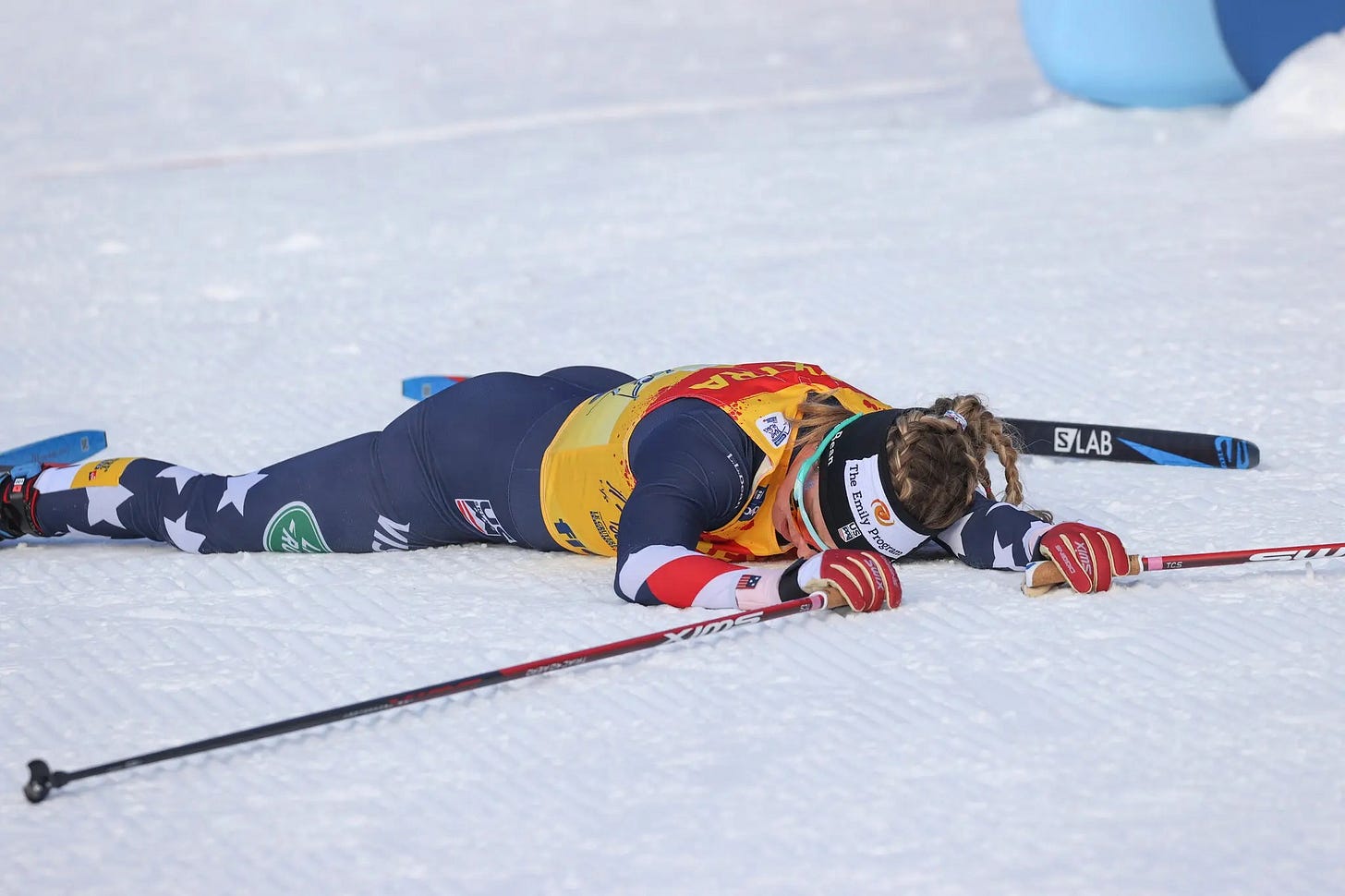Pushing Too Hard or Not Enough
Or, what's the healthy way to strive for any goal?
I did an informal skimo race the other day, and I mentioned my heart-rate stats afterwards to my husband. He asked me if I’d been at max heart-rate and I said no. He was surprised (would be the polite way to put it). “You did a race and your heart rate wasn’t at max?” he said. This made me think. It also made me look again at the stats recorded on my watch, and I saw that I had, in fact, been at my aerobic threshold for the 62 minutes of the race. I reported this to my husband and we agreed that this made sense. At threshold for the whole time. Yes, that was where I should have been. The marriage-athletic-industrial complex of our household was preserved.
But I’ve been thinking about the feel of that race and the handful of others I’ve done recently. I know I wrote last month about how the race up and down the Thunderbolt was the hardest thing I’ve ever done. And it was. I’ve been thinking about the skimo races I’ve done this season, all three of them informal and shorter than the Thunderbolt, and looking back on how it felt to race.
Who cares, you might well ask? I think it’s an interesting question in general—not about me but about how any of us engages with an athletic event that we know is supposed to be or going to be hard. There’s a balance, maybe, between our instinct for self-preservation and our desire to win, simply put. The Olympians on our screens these days clearly have to set aside some of that self-preserving instinct if they’re going to tear down a mountain at 80mph, luge down a chute of ice at 65mph, hurl themselves into the air many feet above the ramp, or just plain exhaust themselves so much that they collapse onto the snow at the finish line of a cross-country event.
Obviously, you can’t achieve at that level, even with the most astonishing physical gifts, unless you’re not being entirely careful. Elite athletes have to be super careful about so much—technique, training, nutrition, equipment, schedule, on and on—but it seems to me, as a very outside outsider, that elite athletes must also have a willingness to accept that harm may come their way. Without that, they are a lot more like the most physically gifted among us who tend to stop just short of the the physical or psychological edge that the gifted will flirt with or go over.
A skimo race starts with skinning uphill. Last Saturday, the fast racers took off at what looked a lot like a run with skis on their feet. If I had done that, a) I would have run out of gas really soon and b) there is no b. I would just have had to stop. Being neither under the age of 30 nor endowed with lots of testosterone, and mindful that I would have to repeat the lap once more to complete the race, I took a slower pace. I stayed, as we say, within myself—which makes me wonder now (heart-rate stats, notwithstanding) if maybe I hadn’t been really racing.
This is the question I’ve been asking myself. Essentially, the question is: since I didn’t collapse onto the snow at the end of the race, utterly gassed and perhaps near vomiting, was I really racing? Or, let’s phrase it maybe a bit more truthfully: since I was supposed to be racing, shouldn’t I have pushed myself so hard I collapsed onto the snow when it was over?
[long pause for thoughts and wincing]
There was a brief time in my life when I didn’t really care very much about my well-being. In constant flight-or-fight mode, charged with adrenaline all day every day, I slept little, ate little, and was never tired. I trained like a maniac, arriving at the boathouse desperately hungry/tired, and heading out for a row in my single all the same. I got really fast. It was kind of awesome. It was also the very opposite of awesome. During that period of several weeks, I didn’t take care of myself with sleep and food and rest because I really didn’t value myself enough to do that.
That period in my life was very specific to a very specific situation and it came to an end with restored health. But I have always pondered it. I can’t help but notice that when I gave myself no value (and by “myself” I quite literally mean my body, my physical self), I could push myself to the very edge and maybe over it. Because I didn’t seek to protect myself from, say, feeling faint at the end of a sprint, I went faster than before. Because I didn’t seek to spare myself from fatigued training, I trained more and built a huge cardio base. Because I wasn’t pacing myself, I went faster than I’d ever gone.
I have always wondered whether there isn’t a bit of this self-destructive impulse in the work of an elite athlete. Is there something paradoxically anti-self even in the work of athletes who have to focus on themselves to get their sport done? If that’s the case (and I realize that it might not be),
—what does that say for the rest of us—whether our challenge is athletic or social or artistic or professional?
—How can we live mentally and physically healthy lives while pushing ourselves the right amount?
It’s complicated, right? There are endeavors we will all undertake—either chosen or forced upon us—for which we really must push to that point of physical or metaphysical collapse. And there are others for which the calculus comes up with a different sum. The hard part is knowing how to tell those endeavors apart. Sure, sometimes it’s obvious. Nobody needs you to go to your cardio red-line for the office corn hole tournament. But—especially with non-sports things, like, ahem, writing—sometimes the balance between the requirements and the situation and our sense of self-worth is a nuanced one, obscure to discern.
With the Winter Olympics all around us now, we have ready examples of the different ways elite athletes respond to a setback or failure to achieve their goal. The snowboarders shrug and smile after they crash or fall. I will confess to sometimes feeling almost put out by their casual reactions. Surely they can’t have taken the endeavor seriously enough—I think, for a ridiculous split second—if, upon disappointment, they show no greater angst? But then, maybe that’s healthy. When another elite skier fails and responds with quiet but distraught grace, the urge is—by contrast—to say, hey, it’s ok, life will go on, to tell her she’s placing too much importance on the goal.
The truth is, there is no right or wrong way to match up effort and goal and reaction. Is there?
I have no answers on this. Just this array of questions to go along with an undying fascination with how elite athletes (and, by analogy, elite anybodies) perform. I think I have at least figured out by now that it helps to have an active approach to all of this. It helps to contemplate and be aware of your attitude and your goals for the big things you undertake in life, and match them up in the way that’s right for you. So: was I really racing last Saturday? Yes. I’d matched my effort with the context and my goal and came up with an approach that was just right. And, heck, I still won my age group.*
*because I was the only person in my age group





